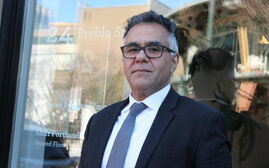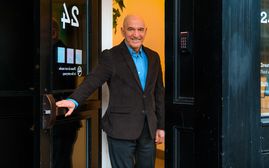Processing Your Payment
Please do not leave this page until complete. This can take a few moments.
- News
-
Editions
-
- Lists
-
Viewpoints
-
Our Events
-
Event Info
- Women's Leadership Forum 2025
- On the Road with Mainebiz in Bethel
- Health Care Forum 2025
- On The Road with Mainebiz in Greenville
- On The Road with Mainebiz in Waterville
- Small Business Forum 2025
- Outstanding Women in Business Reception 2025
- On The Road with Mainebiz in Bath
- 60 Ideas in 60 Minutes Portland 2025
- 40 Under 40 Awards Reception 2025
- On The Road with Mainebiz in Lewiston / Auburn
- 60 Ideas in 60 Minutes Bangor 2025
Award Honorees
- 2025 Business Leaders of the Year
- 2024 Women to Watch Honorees
- 2024 Business Leaders of the Year
- 2023 NextUp: 40 Under 40 Honorees
- 2023 Women to Watch Honorees
- 2023 Business Leaders of the Year
- 2022 NextUp: 40 Under 40 Honorees
- 2022 Women to Watch Honorees
- 2022 Business Leaders of the Year
-
-
Calendar
-
Biz Marketplace
- News
-
Editions
View Digital Editions
Biweekly Issues
- April 21, 2025 Edition
- April 7, 2025
- March 24, 2025
- March 10, 2025
- Feb. 24, 2025
- Feb. 10, 2025
- + More
Special Editions
- Lists
- Viewpoints
-
Our Events
Event Info
- View all Events
- Women's Leadership Forum 2025
- On the Road with Mainebiz in Bethel
- Health Care Forum 2025
- On The Road with Mainebiz in Greenville
- On The Road with Mainebiz in Waterville
- + More
Award Honorees
- 2025 Business Leaders of the Year
- 2024 Women to Watch Honorees
- 2024 Business Leaders of the Year
- 2023 NextUp: 40 Under 40 Honorees
- 2023 Women to Watch Honorees
- 2023 Business Leaders of the Year
- + More
- 2022 NextUp: 40 Under 40 Honorees
- 2022 Women to Watch Honorees
- 2022 Business Leaders of the Year
- Nomination Forms
- Calendar
- Biz Marketplace
On the Record: Portland immigrant center head says it's ‘ultimately about workforce integration’
 Photo / Jim Neuger
Reza Jalali, executive director of the Greater Portland Immigrant Welcome Center and a former refugee from Iran, says the center offers displaced people a second chance.
Photo / Jim Neuger
Reza Jalali, executive director of the Greater Portland Immigrant Welcome Center and a former refugee from Iran, says the center offers displaced people a second chance.
Iran-born writer, educator and community organizer Reza Jalali succeeded the late Alain Nahimana as executive director of the Greater Portland Immigrant Welcome Center. He spoke with Mainebiz about the center’s multi-pronged mission and his vision for it.
Mainebiz: How did you originally connect with the center?
Reza Jalali: I was a fan and a supporter. As an immigrant, I was a stakeholder. I watched it grow with admiration. I appreciated its mission and vision for the community and felt represented.
MB: What should readers know about the center’s mission and programs?
RJ: The Greater Portland Immigrant Welcome Center, which was established in 2017, serves as a hub of collaboration that strengthens the immigrant community through language acquisition, economic integration and civic engagement.
We have four distinctive programs: The Co-working Hub houses a dozen or more immigrant-owned businesses, nonprofits that serve New Mainers, community programs, and so on. It offers the tenants network opportunities. The digital language lab, iEnglish, helps with language acquisition. It supports local organizations to have their non-English speaking employees reach proficiency in English.
The Civic Engagement and Citizenship assists immigrants to get involved in their communities’ civic life, by voting and joining boards and commissions. Finally, our Business Hub acts as a low-barrier resource for those wanting to start or expand businesses (read: creating jobs).
Ultimately, we are about workforce integration in the Greater Portland area.
MB: What are your plans for the center’s Immigrant Business Hub?
RJ: We hope to bring visibility to Maine’s immigrant-owned businesses and their contributions to the state’s economy. Research shows immigrants, compared to their native-born counterparts, are more likely to start businesses. That’s the universal story across the United States.
Our Business Hub is designed to elevate the immigrant business owners. We help them to access loans, engage in best business practices including bulk buying, better bookkeeping, and marketing, among others. We host a fund that was started by an immigrant entrepreneur, that offers low-interest microloans to help those interested in expansion of the enterprises. We believe the future of our beloved state depends on the success of family-owned small businesses, some of which are owned by immigrants.
MB: How will the 2021 edition of your “New Mainers” book differ from the 2009 version?
RJ: When the first book came out, there were hardly any Iraqi, Syrian or French-speaking African immigrants calling Maine home. Together with my co-author, Morgan Rielly, we discovered there were new faces, and new stories to be told. Also, the national narrative related to immigration, which continues to be contentious, and the attention — positive or negative — it receives, deserved a new book to be written. I believe the successful integration of immigrants in Maine can become a national model and a source of pride for all Mainers.
MB: Looking back to your time as a newly arrived immigrant, what lessons from that experience resonate with you today?
RJ: Back then, I felt invisible. And not valued. Despite the fact that I had two college degrees, from universities where every subject was taught in English, I had to start my life in America cooking in a restaurant, selling vacuum cleaners, followed by working the graveyard shift in a factory and attending classes during the day, and so on.
There were a few services to serve the immigrant communities and they were all charity-based, meaning I was seen as someone in need of help, rather than a person who could contribute and add to the richness of society. Now it is much better — Portland is at least an accepting place.
MB: In filling Alain Nahimana’s shoes, how will you carry on his legacy?
RJ: Our co-founder started a path that we continue to follow. He would be proud of our work as we move forward, committed to uplifting and advancement of those arriving in Maine in search of safety and human dignity. After all, we offer the world’s displaced people a second chance.













0 Comments